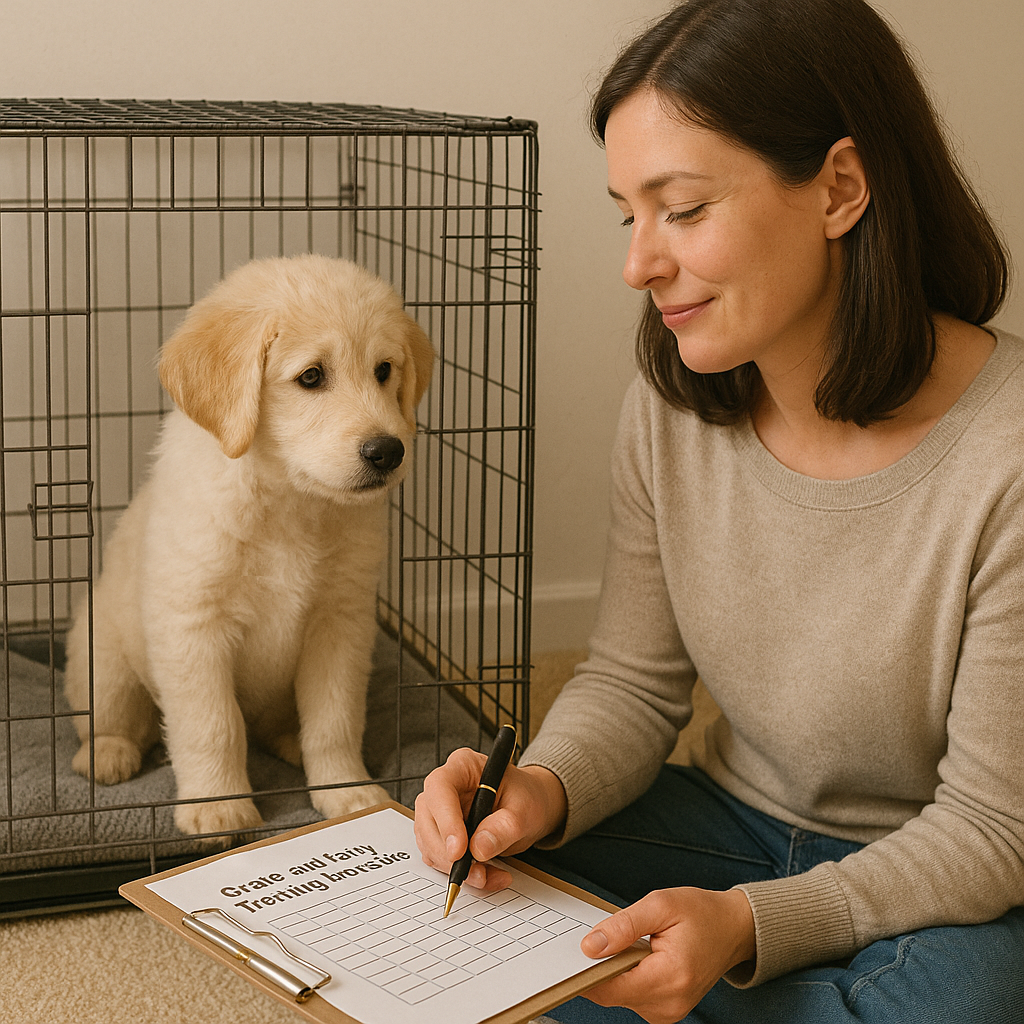Puppy Potty & Crate Training Schedule: A Complete Guide for First-Time Owners

Bringing home a new puppy is exciting—but house training can quickly become overwhelming!
The secret to fast, low-stress potty training is a consistent schedule that combines crate time, play, and regular potty breaks.
This guide walks you through a sample daily routine and gives expert tips for first-time puppy parents.
For a printable day plan, check the Puppy Daily Schedule & Potty Planner.
Why Schedule Matters for Puppies
Puppies have tiny bladders and little idea of what you want.
A predictable routine helps them learn faster and prevents accidents.
Crate training, when paired with regular potty breaks, teaches bladder control and gives your puppy a safe, cozy den.
Sample Puppy Potty & Crate Training Schedule
| Time | Activity | Notes |
|---|---|---|
| 7:00 AM | Out of crate & potty break | Go outside immediately |
| 7:15 AM | Breakfast | Feed in a calm spot |
| 7:30 AM | Potty break | Right after eating |
| 7:45-9:00 AM | Supervised play/training | Watch for sniffing/circling |
| 9:00 AM | Potty break | Before crate time |
| 9:15-11:00 AM | Crate nap | Calm, quiet rest |
| 11:00 AM | Potty break | Immediately after waking |
| 11:15 AM | Play/training | Short sessions |
| 12:00 PM | Lunch | Followed by potty break |
| 12:30-2:00 PM | Crate nap | Rest after eating |
| 2:00 PM | Potty break | After nap |
Repeat this cycle in the afternoon and evening. Take your puppy out:
- First thing in the morning
- After every meal
- After naps or play
- Before and after crate time
- Right before bed
Tip: Puppies under 12 weeks may need to go out every 30-60 minutes when awake!
How Long Can My Puppy Hold It?
A good rule: Number of months old = hours they can “hold it” (up to 5-6 hours max).
For example, a 2-month-old puppy may last 2 hours (less if playing or after eating).
Crate Training Basics
- Choose a crate just big enough for your puppy to stand, turn, and lie down.
- Make it cozy with a blanket and safe toy.
- Feed meals in the crate with the door open at first.
- Never use the crate for punishment.
- Take your puppy out immediately after crate time for a potty break.
Accidents will happen! Clean up with an enzymatic cleaner and avoid scolding—just adjust your schedule and supervision.
Nighttime Potty Training
Young puppies (under 14-16 weeks) may need 1-2 potty trips during the night.
Set an alarm or listen for whining. As your puppy matures, they'll sleep longer between breaks.
Troubleshooting Common Issues
-
Puppy pees right after coming inside?
Stay outside longer—wait until your puppy goes, then praise and treat. -
Frequent accidents in the crate?
Make sure the crate isn't too big and potty breaks are frequent enough. -
Puppy won't use the bathroom outside?
Go to the same spot each time. Limit play/distraction until they finish.
Quick Tips for Success
- Keep a written log of potty times and accidents for the first 2 weeks.
- Use a consistent phrase (“Go potty!”) every time you take your puppy out.
- Reward with treats and praise immediately after your puppy goes in the right place.
- Supervise closely when not in the crate—leash indoors if needed.
You Might Also Like
Want to understand your puppy's personality? 🚀 Try our 3-minute dog personality test to get tailored training tips!
FAQ
How often should I take my puppy out to potty?
Young puppies (under 12 weeks) often
need a break every 30–60 minutes when awake; add about one hour per month of age.
When should I start crate training?
Begin on day one. Keep sessions short and
positive, feed near/in the crate, and pair crate time with immediate potty breaks.
What if my puppy has an accident in the crate?
Clean with an enzymatic cleaner, avoid
scolding, and tighten the schedule. Ensure the crate is just big enough to stand, turn, and lie down.